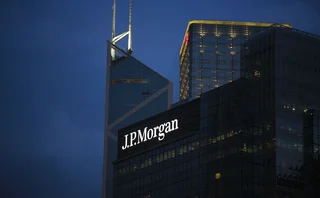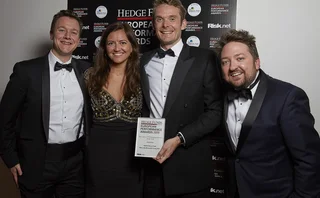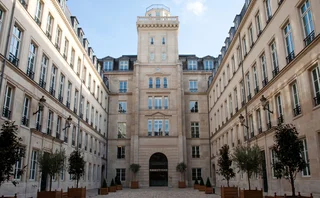
Kairos laments lack of discipline among hedge fund managers
Kairos employs a disciplined approach to leverage, capacity constraints and risk management

Kairos Partners is not your typical company. Combining asset management and private banking, long/short and long-only strategies, single funds and funds of funds, it is setting itself the challenge of becoming a leading firm in Europe and beyond that a global enterprise.
Founded in 1999, Kairos is one of the longest-standing alternative asset managers in London, starting in the City shortly after its peers such as Egerton and Marshall Wace did in the mid-1990s.
Since that point, offices in Milan, New York and Lugano followed. Starting with around $100 million under management, the firm now runs in excess of $9 billion, mainly from London and Milan. The New York office is dedicated solely to research for the fund of hedge funds (FoHF) business, while Lugano concentrates on private banking. The company is 80% owned by partners with the rest in the hands of Julius Baer, following a deal signed in May 2013. Each fund manager and senior person at the firm has the potential to become a partner. The organisation currently employs 140 people, of which 22 are equity owners with new partners being promoted regularly.
Over the last three years, assets under management have almost doubled on the back of performance and new distribution channels. In the early days, the company's clients were mostly family offices, FoHFs, endowments and foundations, but when Kairos opened a private banking business in Milan it also started to attract high-net-worth individuals. The company concentrates on a few specialist areas including European equities, Italian equities, European fixed income and both Ucits and hedge multi-manager solutions. Kairos currently has a diversified client base, including some of the biggest institutional investors in Europe and Asia. For example, the company runs a mandate for one of the world's largest sovereign wealth funds, which appointed Kairos as its sole and dedicated Italian equity specialist.
 Fabio Bariletti (pictured), general manager at Kairos, believes that in times of crisis – and in particular in 2008 and 2011 – the firm's asset management and private banking businesses exhibited high synergies, making its business more stable and allowing the company to protect capital.
Fabio Bariletti (pictured), general manager at Kairos, believes that in times of crisis – and in particular in 2008 and 2011 – the firm's asset management and private banking businesses exhibited high synergies, making its business more stable and allowing the company to protect capital.
The company's founders are cautious about growing too rapidly. The challenge in its asset management business, according to Stefano Prosperi, chief executive of Kairos Investment Management, the London branch of the group specialising in alternative products, is to remain flexible and nimble while at the same time maintaining growth and attracting new talent to the firm. "Since the beginning we have grown the company gradually, making sure that our priority always remained the achievement of superior risk-adjusted returns, rather than pure asset gathering," he says.
Bariletti states: "We don't like the idea of a supermarket. We never launched a series of different products in response to the demands of the market, while hoping that a few of them would be successful. We've always run a concentrated number of funds and launched new strategies only when we found a talented manager who could fit our corporate culture and capitalise on a clear opportunity to deliver absolute performance. We are more of a super-boutique than a supermarket. Every fund manager here is an entrepreneur but, at the same time, benefits from the stability and the infrastructure of a 16-year-old firm with $9 billion in assets under management."
Prosperi mentions three core values that have underpinned the company since inception: first, it was created as a partnership, which has meant that the senior members of Kairos have shared a long history of working together: "Most of the new portfolio managers have been grown within our organisation and we continue to scout and train new talent."
Second, Kairos has always focused on absolute return products. When the firm started, much debate was around whether the era of active management had ended and if passive investment would proliferate instead. Prosperi says: "We went contrarian and created a company that would only offer only absolute return products. History so far is proving us right and after 16 years we are witnessing once again a similar argument. We still believe in our active approach and we welcome the current frenzy surrounding index funds, exchange-traded funds and passive managers. In essence, this trend creates opportunities for our managers who think outside the box and look at opportunities irrespective of their inclusion in an index."
The third principle is that the portfolio managers align themselves with investors by putting their own money in the products alongside clients. "Every new product in Kairos is launched with our own money, which means that our decisions are driven exclusively on the belief that we can make money, rather than simply raise a lot of assets".
Risk management focus
From humble beginnings, Kairos has come a long way, but it has not been an easy road. Prosperi says that having more than $9 billion comes, not just from scouting new talent and exploring new avenues, but also the way the firm navigated 2008 without creating problems for investors, protecting capital and paying investors cash when they wanted to redeem from its funds. "Gating tainted our industry," he says, attributing Kairos's success to good risk management and sticking to simple rules around liquidity and capacity constraints: "We take capacity very seriously - today we run significant money in Ucits funds with daily liquidity. We never forget that the day may come when we need to provide that daily liquidity."
Bariletti says the company has "always been a big believer" in Ucits funds, launching its first in 2006. In 2008, it made a major business decision to put most of its products into Ucits format.
"Since we were liquid and the market was asking for more regulation, it was an obvious choice for Kairos to embrace the Ucits model," says Bariletti. "We don't like excessive leverage, don't invest in illiquid securities and we run very simple strategies." The maximum leverage in its long/short Ucits funds is between 150-180%.
 Prosperi (pictured) agrees that Ucits will grow in popularity. "Now that all over Europe we have a low interest rate environment, the liquid alternative space is an obvious choice for any asset allocator," he says. "Ucits is capturing not only a portion of those investors that prefer the better liquidity and regulatory framework compared to the hedge funds, but also a new breed of investors who historically have only invested in traditional funds and today are accessing the alternative space using the liquid format."
Prosperi (pictured) agrees that Ucits will grow in popularity. "Now that all over Europe we have a low interest rate environment, the liquid alternative space is an obvious choice for any asset allocator," he says. "Ucits is capturing not only a portion of those investors that prefer the better liquidity and regulatory framework compared to the hedge funds, but also a new breed of investors who historically have only invested in traditional funds and today are accessing the alternative space using the liquid format."
Recognising capacity constraints in its strategies is a strength of the company. When the firm first began its flagship product, the Kairos Fund, it managed just $100 million but its assets peaked at $2 billion under management in 2004-05, at which point the vehicle closed to new investors. Bariletti says: "If you pay more attention to performance, rather than size, by definition you will have, from time to time, funds that cannot take capital."
The portfolio manager of the Kairos Fund, Roberto Condulmari, retired two years ago. The fund then closed and money was returned to investors. In its 14 years, the fund produced a cumulative return of 160%, while over the same period the MSCI Europe Index was down more than 6%. Prosperi believes that the common denominators among failing hedge fund managers are lack of discipline and inability to employ strict risk management.
Speaking 48 hours ahead of the Greek referendum on its European Union bailout, Bariletti said that the portfolio managers at the firm had spent the previous day de-risking their portfolios: "We reduced the net and the gross in most of the funds we run as part of our mandate to protect capital. We believe that in our business it is important to be active in reducing risk when unexpected circumstances materialise, rather than being forced to take decisions because of stop losses and breaches of risk limits. Our historical track records show that if you limit the downside, when it is the time to shine, you can generate superior returns."
Aristotelian aspirations
In Greek mythology, Kairos, the youngest child of Zeus, was the god of opportunity. In classical rhetoric, Kairos means ‘the right moment'. The group embraces this ethos in its search for new opportunities and this has paid off. At the Hedge Funds Review European Fund of Hedge Funds Awards in 2014, Kairos picked up two awards for its Multi-Strategy Fund, while Bariletti was honoured for his outstanding contribution to the hedge fund industry.
At this year's Hedge Funds Review European Single Manager Awards, it picked up an award for best hedge fund group as well as for best equity hedge alternative Ucits fund for its KIS KEY fund, while its Pegasus Fund won best new hedge fund.
Kairos decided to re-enter the traditional hedge fund space in 2014 with the Pegasus Fund, run by Federico Riggio, which was seeded with $40 million of partners' money. More concentrated than its other European equity long/short Ucits funds and with greater gross exposure, the event and catalyst-driven strategy has monthly liquidity. Named after the winged horse from Greek mythology, Pegasus returned +52.99% in its first year. Besides the return, what made the fund unique is that around 40% of the returns were generated from single-name shorts.
Overall, last year was a great environment for Kairos and its funds, but the company is not sitting back and is already fully engaged in its plan to grow from being a leading European manager into a global player.
"We have a lot of room to grow," says Prosperi. "This is our moment. We see a lot of demand for absolute return products and high barriers to entry for newcomers. Both factors really play in our favour and we want to capitalise on it. We will continue to focus on growing our existing products, but at the same time we are working to expand the breadth of our asset management business. We are actively looking for new talent and resources, which could allow us to enter new areas of expertise and launch new funds. The solidity of our asset management brand and the strength and stability offered by our private banking business makes our firm an appealing place for new talent."
He concludes: "We are not a hedge fund platform that typically tends to attract managers who plan to build a track record and spin out after a few years. Neither are we the typical large institution where often, in exchange for stability and assets, portfolio managers compromise in terms of flexibility and entrepreneurial spirit. We are a partnership focused on the aggregation of individual talent and driven by the belief that the power of several independent minds working together is far superior as a collective than the value of each of them taken individually. A team that shares the same values and principles is always going to be greater than the sum of its parts."
Only users who have a paid subscription or are part of a corporate subscription are able to print or copy content.
To access these options, along with all other subscription benefits, please contact info@risk.net or view our subscription options here: http://subscriptions.risk.net/subscribe
You are currently unable to print this content. Please contact info@risk.net to find out more.
You are currently unable to copy this content. Please contact info@risk.net to find out more.
Copyright Infopro Digital Limited. All rights reserved.
As outlined in our terms and conditions, https://www.infopro-digital.com/terms-and-conditions/subscriptions/ (point 2.4), printing is limited to a single copy.
If you would like to purchase additional rights please email info@risk.net
Copyright Infopro Digital Limited. All rights reserved.
You may share this content using our article tools. As outlined in our terms and conditions, https://www.infopro-digital.com/terms-and-conditions/subscriptions/ (clause 2.4), an Authorised User may only make one copy of the materials for their own personal use. You must also comply with the restrictions in clause 2.5.
If you would like to purchase additional rights please email info@risk.net
More on Hedge funds
JP Morgan warns hedge funds to expect intraday margin calls
US bank may demand variation margin ‘up to seven’ times a day after Archegos default
Alternative markets give edge to Florin Court strategy
By concentrating on exotic and alternative markets, Florin Court Capital Fund has sidestepped overcrowding and correlation to the main trend following commodity trading advisers, offering investors a diversified alternative to the standard systemic macro…
Global macro views combine with quantitative models to produce consistent returns
The team behind River and Mercantile Group’s global macro strategy team operates under two key principles: that macro is the most important aspect of any investment decision and that decision-making should incorporate both systematic and discretionary…
On the offensive – Seeking a new edge, buy-side invests in portfolio and risk analytics
A fast-moving, headstrong hedge fund – hit by rare losses after a black swan event touched on an overweight country exposure – ponders adding fresh quantitative expertise. Much to traders’ chagrin, the chief investment officer and chief operating officer…
Esma backtracks on account segregation
Status quo protected for rehypothecation of collateral in tri-party, securities lending and prime brokerage
Redemptions focused within strategies suffering losses in 2016
Redemptions focused within strategies suffering losses in 2016
Hedge fund redemptions a dismal end to a bad year
Managed futures funds saw big inflows in 2016, but left investors disappointed
Larger funds are net losers as outflows continue
Managed futures funds have seen biggest redemptions for three years






